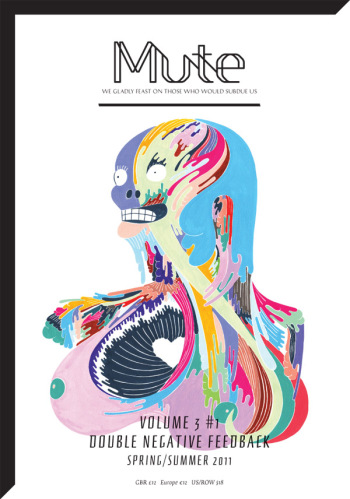Mute, 3(1): Double Negative Feedback (2011)
Filed under magazine | Tags: · architecture, art, capitalism, contemporary art, cultural politics, economics, financial crisis, journalism, music, neoliberalism, networks, politics, uk, wikileaks

“‘Double Negative Feedback’ expresses the hope that the chaos unleashed by the cybernetic loops of financialisation, post-Fordist production and networked life might not only be entropic and exploitative. The noise generated by ‘positive feedback’ also takes the form of the explosions we are seeing in the Arab world, the anti-disciplinary uses of cybernetic control systems, the ‘shared precarity’ of compositional improvising, and the ripples of a political organising that no longer assumes a common identity but instead acknowledges our common vulnerability. This issue scouts out such double-negative loops in a landscape dominated by the relentless, if often misfiring attempt to put feedback to work.”
Edited by Josephine Berry Slater
Publisher Mute, London, June 2011
Edward Larkey (ed.): A Sound Legacy? Music and Politics in East Germany (2000)
Filed under book | Tags: · cultural politics, east germany, germany, music, music history, politics

Collection of papers from a one-day workshop organized by Edward Larkey under the title “A Sound Legacy? Music and Politics in East Germany” at AICGS on December 3, 1999.
The volume brings together practitioners as well as music historians in an effort to reflect upon the development of music culture in preunification East Germany, and to provide a background perspective for aspects of music culture in the postunification period.
Published by American Institute for Contemporary German Studies, 2000
Harry & Helen Gray Humanities Program Series, Volume 8
ISBN 0-941441-53-9
74 pages
Jacques Barzun: Darwin, Marx, Wagner: Critique of a Heritage, 2nd ed (1941–)
Filed under book | Tags: · art, culture, darwinism, evolution, history, marxism, music, philosophy, politics, revolution, science

The nomination of Wagner rather than Freud in the trinity of emblematic modern minds is a sign of Barzun’s profound interest in music and the arts. He argued that these men achieved their reputations by catching the spirit of the age, like surfers on a wave, backed by the formidable public relations exercises mounted by their followers . This earned them the status of intellectual icons despite their lack of originality and the significant flaws in their systems. He described in some detail how all the leading ideas of evolutionary theory, socialism and the leading role of the artist were commonplace for decades before the big three started work.
Barzun was especially critical of the way that their adherents promoted determinism and scientism, with truly disastrous political consequences in the twentieth century. In addition to the shortcomings of their systems, two of the three titans were monstrously egocentric and unprincipled exploiters of their friends and denigrators of their enemies. These personal characteristics became prominent in the modus operandi of their followers, setting the tone for bad manners in transactions between intellectuals that have persisted to the present time.
Reprint of the revised 2nd edition, 1958, with a new Preface, 1981
Publisher University of Chicago Press
ISBN 0226038599
373 pages
PDF (updated on 2014-9-5)
Comment (0)
